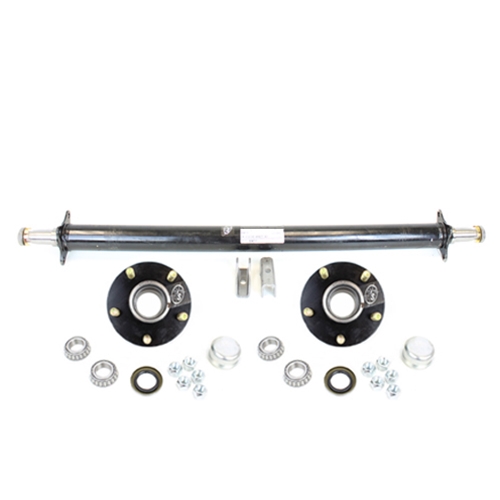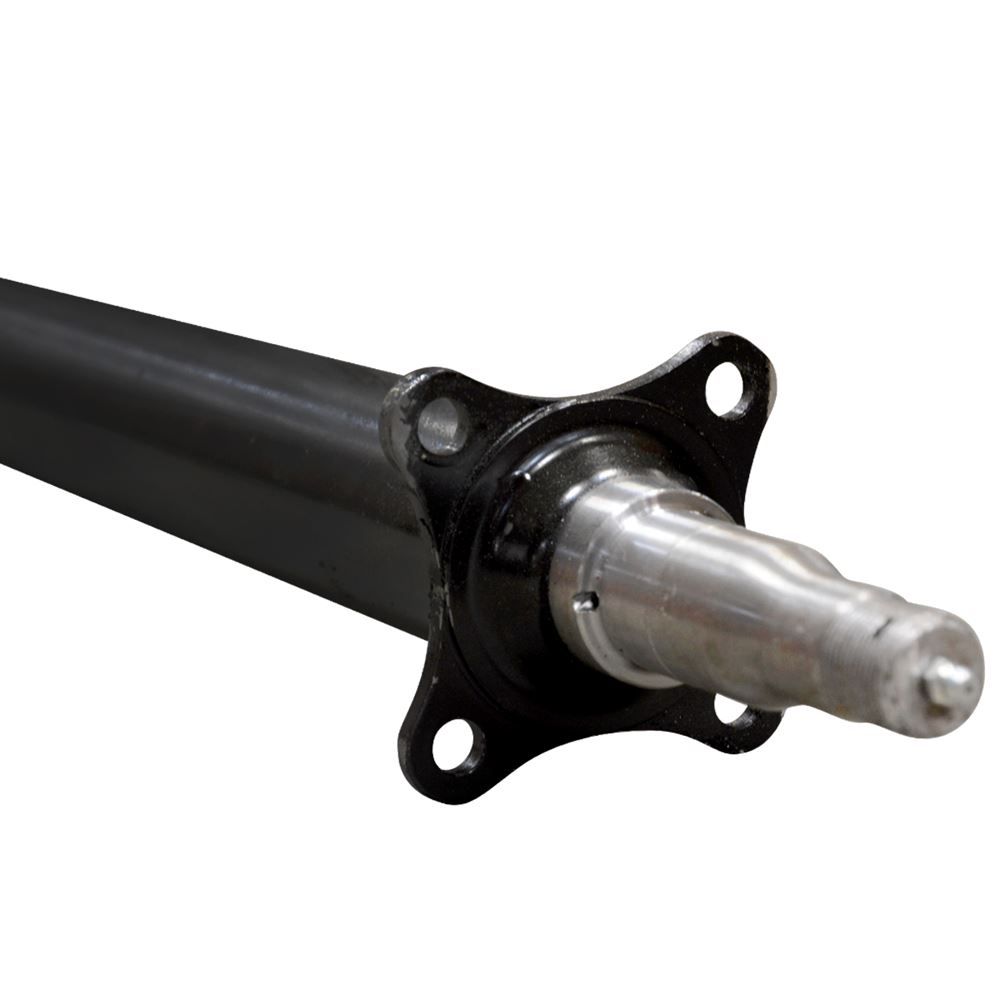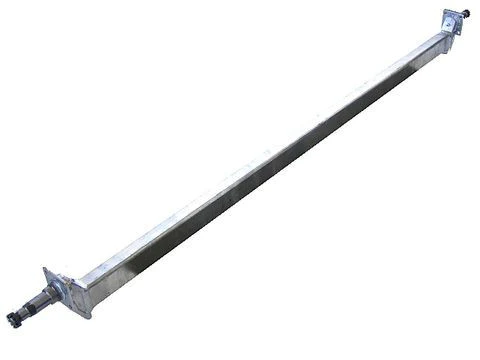Product Description
Products Description
Integrated axle tube with strong heavy-duty capacity
Adopting 20Mn2 high-strength alloy seamless steel pipes, the product quality is more reliable.
Strong load-bearing capacity, ensuring long-term and efficient operation of vehicles.
Has stronger bending and torsion resistance, and does not bend or deform under high strength.
|
Model |
Max. Capacity |
Inside and Outside |
Screw Thread |
Shaft Tube |
L(mn) |
Weight |
|
DRGA13 |
13 |
88.9/88.9 |
UNS3.48-12 |
150*150*13 |
2108 |
120 |
|
DRGA15 |
15 |
99.9/88.9 |
UNS3.48-12 |
150*150*15 |
2128 |
130 |
|
DRGA16 |
16 |
99.9/88.9 |
UNS3.48-12 |
150*150*16 |
2128 |
150 |
|
DRGA20 |
20 |
110/88.9 |
UNS3.48-12 |
150*150*20 |
2173 |
160 |
Details Images
Hot rotary rolling – improving workpiece strength
Shafting of shaft tubes – resistance to deformation, bending, and load
Heat treatment – changing the composition of the workpiece to improve its performance
CNC processing – stable quality and high production efficiency
Precision grinding – high machining accuracy, improving product stability
Automatic gas shielded welding – firm and reliable, with guaranteed quality
Application scenario
Company Profile
ZheJiang Darong Machinery Co., Ltd :
We are located in ZheJiang , China. Founded in 2001, we focus on the R & D and manufacturing of trailer axles. At present, thegroup’s main products include disc axles, drum axles, low plate axles, three-line 6 axle axles, concave axles, eccentric axles,small tonnage trailer axles, semi-finished axles and various types of suspensions, leaf springs, outriggers and traction pins. The cooperative customers are located in more than 50 countries and regions such as Asia, Europe, Latin America, the Middle East, Australia and Africa, helping many customers create higher benefits and values.
Why Choose Us
We have the most advanced production equipment and technology to ensure the quality of trailer axles. There is a very mature axle manufacturing process to produce axles according to the different needs of customers. Each axle is manufactured through more than 10 processes, and finally, the quality inspection procedure of the axle ensures that each axle is a qualified product.
Customer Photos
many customers come to our factory for inspection. Welcome to visit our factory if you have time. You can visit our workshop. Our equipment is a complete set of axle processing equipment. At present, the most advanced automatic assembly process equipment on the market, as well as tools to automatically test the torque of axle bolts, ensure the stability of product quality.
Product packaging
Our Advantages
We have obtained the ISO9001:2015 quality system certification, and are a strong supplier of Alibaba. We have obtained the SGS certification and the ZheJiang high-tech enterprise certification. The company has strong technical research and development strength, and can customize products according to customer needs.
/* January 22, 2571 19:08:37 */!function(){function s(e,r){var a,o={};try{e&&e.split(“,”).forEach(function(e,t){e&&(a=e.match(/(.*?):(.*)$/))&&1
| After-sales Service: | 24h |
|---|---|
| Condition: | New |
| Axle Number: | 3 |
| Application: | Trailer |
| Certification: | ASTM, CE, DIN, ISO |
| Material: | 20mn2 |
| Samples: |
US$ 250/Piece
1 Piece(Min.Order) | |
|---|
| Customization: |
Available
| Customized Request |
|---|

How do innovations in axle technology impact trailer design and towing?
Innovations in axle technology have a profound impact on trailer design and towing capabilities. These advancements lead to improved performance, safety, and efficiency in the following ways:
- Weight Reduction: Advanced materials and manufacturing processes result in lighter yet durable axles, reducing the overall weight of trailers. Lighter trailers require less fuel to tow and can carry more payload within legal weight limits.
- Increased Load Capacity: Innovations like stronger axle materials and better load distribution systems allow trailers to carry heavier payloads while maintaining stability and safety.
- Suspension Enhancements: Axle technology improvements often go hand in hand with suspension innovations, providing smoother rides, better handling, and enhanced shock absorption. This is particularly valuable for cargo protection and driver comfort.
- Improved Durability: Enhanced axle components and coatings contribute to increased durability, reducing maintenance and replacement costs over the trailer’s lifespan.
- Safety Features: Innovations in axle technology can include safety features like integrated braking systems, anti-lock brakes, and sensors for monitoring axle performance and load conditions.
- Fuel Efficiency: Reduced weight and improved aerodynamics, often influenced by axle design, result in better fuel efficiency, reducing operating costs for fleet owners and individual haulers.
- Tire Wear Reduction: Axle advancements can lead to more even weight distribution on tires, reducing wear and extending tire lifespan. This not only saves money but also enhances safety on the road.
- Environmental Impact: Lighter and more fuel-efficient trailers have a smaller carbon footprint, contributing to reduced emissions and environmental benefits.
- Towing Stability: Axle innovations can improve trailer stability, reducing the risk of sway and rollovers, especially in adverse weather conditions.
- Adaptability: Many advanced axles allow for easy adaptation to various trailer types, making them versatile for different hauling needs.
Overall, innovations in axle technology play a crucial role in advancing the trailer industry. They provide economic, environmental, and safety benefits, making trailers more efficient, durable, and versatile for a wide range of towing applications.

Can you describe the maintenance and repair considerations for trailer axles?
Proper maintenance and timely repairs are essential to ensure the safe and reliable operation of trailer axles. Here are key maintenance and repair considerations:
1. Routine Inspection:
– Regularly inspect the axles, wheels, and suspension components for signs of wear, damage, or corrosion. Check for loose or missing fasteners.
2. Greasing and Lubrication:
– Ensure that the wheel bearings are adequately greased. Over time, bearings may require repacking or replacement to prevent overheating and damage.
3. Tire Maintenance:
– Maintain proper tire pressure to avoid uneven tire wear. Replace damaged or worn-out tires promptly.
4. Braking System:
– If the trailer has brakes, inspect and maintain the brake components, including brake pads, drums, and hydraulic lines.
5. Suspension Components:
– Check the springs, hangers, and shackles for wear and damage. Ensure that the suspension system is in good condition to provide a smooth ride and proper weight distribution.
6. Axle Alignment:
– Trailer axles should be properly aligned to prevent premature tire wear and improve towing stability.
7. Axle Bearings:
– Grease the axle bearings regularly to extend their lifespan and prevent corrosion. Replace worn bearings as needed.
8. Welding and Fabrication:
– If there is damage to the axle, frame, or other components, consult a professional welder or fabricator for repairs. Proper welding and reinforcement are crucial for structural integrity.
9. Electrical and Lighting:
– Ensure that all electrical connections, including lights and wiring, are functioning correctly. Faulty lighting can lead to safety hazards.
10. Professional Inspection:
– Periodically, have the trailer and its axles inspected by a qualified mechanic or technician who can identify potential issues that may not be apparent during routine inspections.
11. Timely Repairs:
– Address any identified problems promptly. Delaying necessary repairs can lead to more extensive damage and safety risks.
12. Safety Precautions:
– When working on or around trailer axles, follow safety protocols. Use appropriate safety gear and tools, and take precautions to prevent accidents.
– It’s important to refer to the trailer’s owner’s manual or manufacturer’s guidelines for specific maintenance and inspection schedules.
– Adhering to a proactive maintenance and repair regimen ensures that trailer axles remain in optimal condition, minimizing the risk of breakdowns and accidents while prolonging the lifespan of the trailer.

Are there different weight capacities for trailer axles depending on the trailer type?
Yes, trailer axles come in various weight capacities, and the capacity depends on the specific trailer type and its intended use. Here are some common weight capacities for different trailer types:
1. Utility Trailers:
– Utility trailers often have single axles with weight capacities ranging from 1,000 to 3,500 pounds. These trailers are used for light-duty hauling and general-purpose applications.
2. Boat Trailers:
– Boat trailers can vary widely in weight capacity based on the size of the boat they are designed to carry. Smaller boat trailers may have weight capacities of 3,000 to 5,000 pounds, while larger ones can exceed 10,000 pounds.
3. Enclosed Trailers:
– Enclosed trailers, used for transporting cargo, merchandise, or personal items, can have weight capacities from 2,000 to 12,000 pounds or more, depending on their size and construction.
4. Flatbed Trailers:
– Flatbed trailers are available in various weight capacities to accommodate different cargo loads. Common capacities include 7,000, 10,000, and 14,000 pounds, among others.
5. Dump Trailers:
– Dump trailers, designed for hauling materials like gravel or construction debris, may have weight capacities ranging from 5,000 to 20,000 pounds, or even higher for heavy-duty models.
6. Car Hauler Trailers:
– Car hauler trailers, used to transport vehicles, typically have weight capacities of 7,000 to 14,000 pounds, depending on the number of axles and the size of the trailer.
7. Gooseneck Trailers:
– Gooseneck trailers are heavy-duty and often used for transporting large equipment or livestock. Their weight capacities can range from 10,000 to 30,000 pounds or more.
8. Specialty Trailers:
– Specialty trailers, such as equipment trailers, horse trailers, and concession trailers, have weight capacities tailored to their specific purposes and design.
– It’s crucial to select a trailer with an axle and weight capacity that matches the intended load. Overloading a trailer can lead to safety risks, damage to the trailer, and legal issues. Manufacturers provide weight ratings and guidelines for each trailer type to help buyers choose the right option for their needs.


editor by CX 2024-03-29